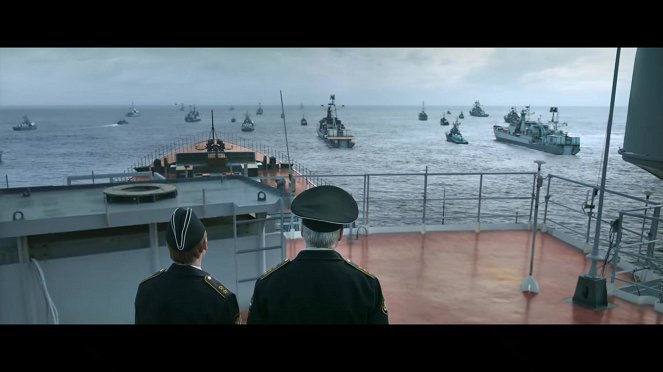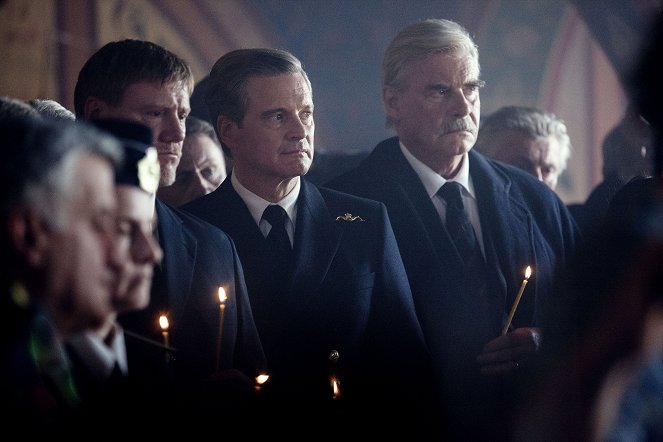Directed by:
Thomas VinterbergScreenplay:
Robert RodatCinematography:
Anthony Dod MantleComposer:
Alexandre DesplatCast:
Matthias Schoenaerts, Léa Seydoux, Colin Firth, Peter Simonischek, Magnus Millang, Max von Sydow, Artemiy Spiridonov, August Diehl, Bjarne Henriksen (more)VOD (3)
Plots(1)
Based on the story of the 2000 Kursk submarine disaster, Kursk follows the final hours of an “unsinkable” Russian nuclear submarine as it sinks to the bottom of the Barents Sea. Some of the crew survives the initial explosion, including officer Mikhail Kalekov, whose pregnant wife and child are waiting back home. Unfortunately, their rescue is complicated by bureaucracy between Russia, France, Norway and Britain, with British navy chief David Russell attempting to convince Russian officials to accept foreign aid. (EuropaCorp USA)
(more)Videos (4)
Reviews (9)
I remember the TV coverage of the disaster and the film captures it faithfully, including the injection of a sedative to one of the distraught mothers. Anyway, one thing is clear from the film: if something similar happened to any of the NATO armies that the local Putin trolls spit on as much as they can, their leadership might break ranks to save these boys. But the Russian military leadership has a different yardstick, the ‘there’s plenty of us’ rule. In Russia, human life has never been worth anything, ever since the Battle of Stalingrad, when they deployed young unarmed boys to the front lines with firing squads at their backs. As Papa Stalin used to say: “The death of one man is a tragedy, the death of millions is a statistic.” Russia, a land of unlimited possibilities...
()
I'm not a big fan of submarines and the Navy, so I went into this film more out of curiosity and it wasn't bad. The explosion in Kursk is filmed decently and the following submarine survival drama is filmed entertainingly though it definitely could have been grittier as well as more gripping. I wasn't bored but I'm not the target audience. However, for fans of submarines and movies based on true events, I recommend it. 60%.
()
The sailor characters could have been further developed other than through clichéd family ties to their wives and children, but the admirals on the surface richly compensate for that with their varied motivations and political backgrounds. Colin Firth is as well suited to the captain character as Tom Hanks. Not to mention the communist Soviet admiral played by Max von Sidow, who turns in a goosebump-inducing performance. The casting in general is very well done here; I hadn’t realised until now how much Schoenaerts and Seydoux have “Russian faces”. But what I appreciate most about Kursk is its thematic balance and complexity. To the same extent that Kursk is about the tragedy of men under water, it is also about the political conflict above the surface and the absurdity of the Soviets’ approach to the event. It’s about a rotten system that betrayed its own people because of false ideas. The second Chernobyl in 14 years. The film gains its key value from the skirting of the story through a young boy, the son of one of the submariners, and his understanding of the situation and his reaction to it.
()
The Command is drowning in an obviously endlessly cut post-production hell where there's no time for practically anything, so the character roles are either melodramatic, expositional, or agents of righteous popular anger, without giving us a chance to lick anything real out of any of them. The sequences with the clucking wives in particular sound almost funny in their attempt to somehow smuggle female characters into the overall story, who in all three scenes gradually don't find out what happened to their husbands. But according to the film's stills from scenes that aren't in the film at all (see gallery), far more importance was probably attached to their relationship with each other and their subsequent desperate inability to act. One thing is rather unique about The Command, though. Namely, that we're watching heroes who find themselves in a situation familiar from many other films that we're used to seeing them overcome in the name of a happy ending and our reward for the suspense. The scenes from inside the submarine have exactly the same character and development as all other scenes of this type, except that we know from the beginning that it's not going to end well and everyone is going to die. Yet we experience the same situations, great sacrifices, and unimpressive heroics that, if it had ended well, would have underscored their importance in preserving the characters of the protagonists. Of course, the feeling of holding your breath in the underwater sequences with the hero trying to pull an unconscious friend above the surface, even though you know they have only a few hours to live anyway, doesn't really inspire suspense so much as it teaches a lesson about the power of self-preservation in the face of an imminent and complete end. Self-preservation that no one will ever know about, but which gives meaning to existence until its last moment.
()
The portrayal of the character of the sailors is poor and two-dimensional, even in the tense “it’s not there” moments. The portrayal of the life in a submarine and the accident is, on the other hand, brilliant. It’s dark, claustrophobic, chilling and without pathos. Vinterberg successfully reconstructs an historical event about the life and death of the sailors of a nuclear submarine and the main thing missing is, paradoxically, a bit of life and energy.
()



Ads